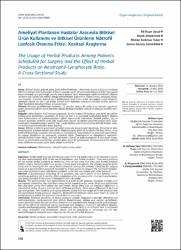Ameliyat Planlanan Hastalar Arasında Bitkisel Ürün Kullanımı ve Bitkisel Ürünlerin Nötrofil Lenfosit Oranına Etkisi: Kesitsel Araştırma
Abstract
Objective: Herbal medicines are increasingly used. There are publications in the literature reporting that approximately 80% of the world population uses herbal products. Since many patients do not accept herbal products as medicines, they do not state that they used herbal products before surgery. Herbal products are known to have many side effects. The primary purpose of the study was to investigate the use of herbal products among the patients scheduled for surgery based on a questionnaire prepared. Secondarily, it was aimed to compare the neutrophil lymphocyte ratio of patients who used herbal products in the last one month with other patients. Method: A questionnaire consisting of 11 questions was administered to the patients in the anesthesia policlinic for 3 months. After completion of the questionnaire, neutrophil and lymphocyte levels included in the current hemogram were recorded Results: The questionnaire was administered to a total of 445 patients. Hundred and fifty-nine participants stated that they had been using herbal products so far, while 39 of them stated that they had been using them within the last month. While there was no statistical difference in educational status of users and non-users of herbal products, there was a difference in terms of age and gender. Two hundred and eighty patients stated that the usage of herbal products was not questioned during previous surgeries. Neutrophil-lymphocyte ratios were lower in users of herbal products within the previous month than in non-users. Conclusion: Potential problems of herbal products include coagulation disorder (bleeding and anticoagulation), cardiovascular side effects (hypertension, edema and cardiac arrhythma), water and electrolyte disorder (sodium retention and hypokalemia), hepatotoxicity and prolongation of the effects of anesthetic agents (confusion and sedation), endocrine side effects (hyperglycemia and hypoglycemia). Neutrophil / lymphocyte ratio (NLO) is an indicator that is calculated by using neutrophil and lymphocyte values and its popularity is increasing day by day. Anesthesiologists should be more attentive on the use of herbal products. © Copyright Anesthesiology and Reanimation Specialists’ Society.


















